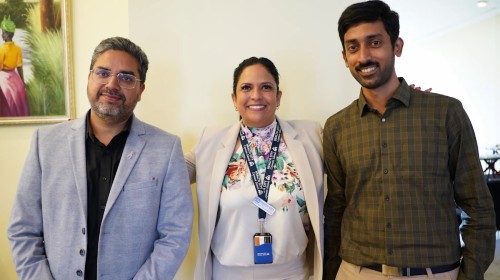Health City Radiation Oncologist Enthusiastic About Transforming Cancer Care in the Caribbean
MONTEGO BAY, Jamaica – The new, state-of-the-art Health City Cayman Islands Radiation Oncology Centre in George Town is spearheading a transformative era in cancer care in the Caribbean.
 Health City’s team at the conference included (from left) Dr. Vikas; Sales and Marketing Specialist Ingrid Harris; and Dr. Jaganmurugan Ramamurthy, Consultant Surgical Oncologist.Dr. Vikas Roshan, Radiation Oncologist at Health City Cayman Islands, participated in the Caribbean Association for Oncology and Hematology’s annual conference in Montego Bay, Jamaica earlier this month. He conveyed his team’s satisfaction with the remarkable patient outcomes achieved at the new facility, which is extending exceptional care to both Caymanian and Caribbean residents who otherwise face the burden of seeking expensive treatments abroad.
Health City’s team at the conference included (from left) Dr. Vikas; Sales and Marketing Specialist Ingrid Harris; and Dr. Jaganmurugan Ramamurthy, Consultant Surgical Oncologist.Dr. Vikas Roshan, Radiation Oncologist at Health City Cayman Islands, participated in the Caribbean Association for Oncology and Hematology’s annual conference in Montego Bay, Jamaica earlier this month. He conveyed his team’s satisfaction with the remarkable patient outcomes achieved at the new facility, which is extending exceptional care to both Caymanian and Caribbean residents who otherwise face the burden of seeking expensive treatments abroad.
“Comprehensive cancer care services have now become accessible within the Cayman Islands,” declared Dr. Vikas. He elucidated that, beyond radiation therapy, his team conducts intricate surgeries and administers chemotherapy and targeted therapies.
“Our cases undergo rigorous deliberation within the multidisciplinary tumor board, facilitating the selection of the most optimal treatment paths based on individual patient profiles, such as stage and performance score,” elaborated the seasoned oncologist. At the Jamaica conference, Dr. Vikas highlighted Health City’s prowess in managing diverse emergencies and malignancies, thereby underscoring the medical and technological capabilities of the institution.
Over the past few months, the facility has been providing cutting-edge cancer services, encompassing routine radiosurgery procedures as well as sophisticated techniques such as volume modulated arc therapy (VMAT), administered through a Siemens TruBeam Varian Linear Accelerator.
The Centre’s future agenda encompasses the introduction of additional services such as external beam radiation therapy (EBRT), 3-D conformal radiation therapy (3DCRT), intensity-modulated radiation therapy (IMRT), and image-guided radiation therapy (IGRT). Specialized services including stereotactic radiosurgery (SRS), stereotactic body radiotherapy (SBRT), and total body irradiation (TBI) will be made available.
Scheduled to fully launch next year, Health City Camana Bay will feature a range of medical specialties that are currently unavailable in the Cayman Islands. Among these, a neonatal intensive care unit (NICU), an emergency pavilion with a critical care unit, and an extensive multispecialty program incorporating robotic surgery will play central roles.
Recent years have witnessed the formulation of new care standards, informed by evidence from clinical trials, to address the global prevalence of rectal cancer cases. In 2020, the World Health Organization (WHO) reported approximately 26 new cases of colorectal cancer per 100,000 individuals in the Caribbean. During the same period, the Pan American Health Organization (PAHO) highlighted colorectal cancer as the third most common cancer type, constituting 10 percent of all malignancies worldwide, following breast and lung cancers.
In his presentation on “Short Course Radiotherapy vs. Long Course Radiotherapy in Rectal Cancer”, Dr. Vikas underscored the critical role of magnetic resonance imaging (MRI) in developing treatment plans for rectal cancer patients. He stressed, “MRI before treatment could easily predict the extension of the disease beyond the colorectal tissue.’’
Dr. Vikas affirmed the European guidelines’ reliance on MRI for determining risk-based treatment strategies. Low-risk patients are recommended for surgery, intermediate-risk cases undergo short-course radiotherapy followed by surgery, while high-risk patients receive long-course radiotherapy before surgery.
Elaborating on treatment nuances based on cancer location within the rectum, Dr. Vikas detailed that advanced-stage disease (lower rectum) calls for long-course radiotherapy followed by surgery six to eight weeks later. Conversely, other rectal regions are managed with short-course radiotherapy, followed by surgery within one to eight weeks. Amidst the diversity of treatment methods, supportive evidence also exists for the utilization of short-course radiotherapy in advanced cancer care prior to surgery.
Dr. Vikas accentuated the importance of continuing medical education regarding new developments in rectal cancer management. He expressed his delight in establishing connections with accomplished colleagues from the region during the Jamaica conference and noted plans were afoot for enhanced collaboration to elevate clinical services.


